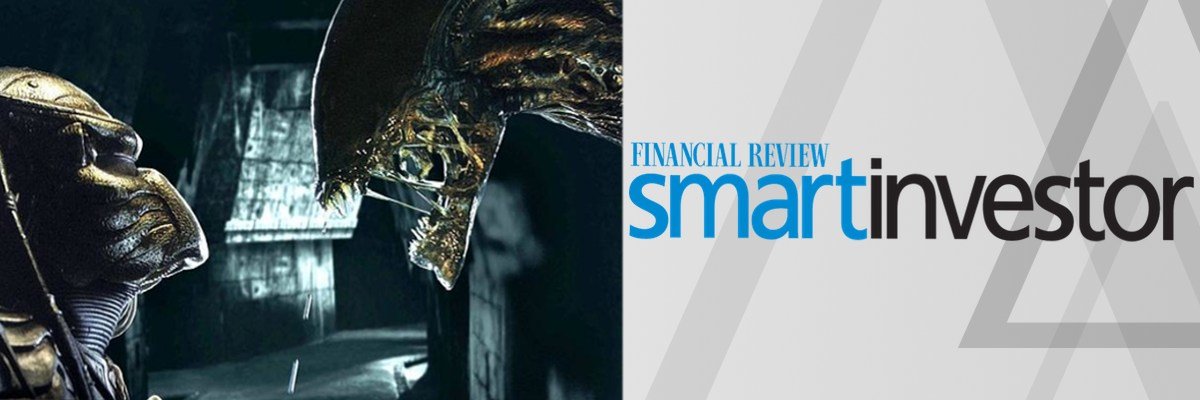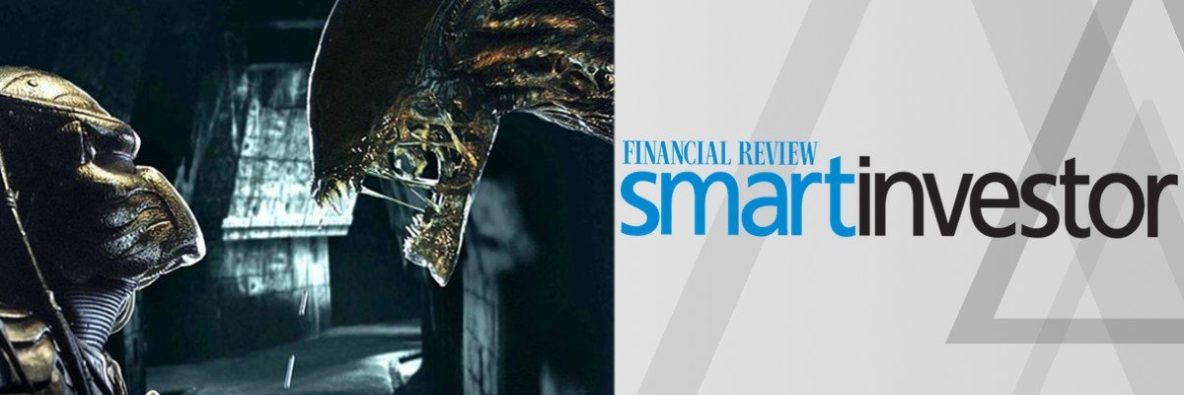
First published BRW and Smart Investor, 22 August 2014 and written by Loftus Peak’s CEO Alex Pollak. Australian investors, especially self managed super funds, should consider diversifying their portfolios to include blue chip global disrupters like Google and Apple.

The Apple Predator looks like it’s about to be bunted out of the airlock into deep cyberspace by the Google Alien
The two scariest monsters ever realised on film were Alien Queen (from Alien) and the Predator. The former, which was referred to as a xenomorph, laid an egg inside its victim that later busted out, literally, as a hungry, acid-blooded killer. The Predator was a marooned hunter from outer space which wound up taking Arnold Schwarzenegger on. The bright sparks in Hollywood thought it would be a great idea to put them into the one movie to, like, see who would win. Eschewing subtlety, they called this movie Alien vs Predator (or AvP). I love those guys.
I sometimes think about this movie in the context of Apple and Google, which are playing out their own version of AvP in a struggle which insiders know is no less brutal than the movie. I call this movie AvG. And another scene was written this month, when the AFR revealed new research which showed that Google’s Android is now outselling Apple in tablets in Australia.
Google’s Android is now outselling Apple in tablets in Australia.Financial ReviewFirst, the vital stats in the AvG match: Apple is the real heavyweight, valued at $US600 billion ($644 billion) – $US100 a share – compared with Google’s relatively nimble $US400 billion ($US584 a share). Each Apple share is forecast to make US$6.31 in 2014, while Google shares should earn US$26.50 each. In absolute dollar terms, Apple makes more money, a lot more, than Google – $US59 billion, compared with $US19 billion in EBITDA.
But as with any outer-space guys’ fight, the weigh-in stats are just the beginning. The critical figures are in reach and growth, and it is here that Google shows how dangerous it is. Apple currently has around 600 million user accounts in the world. This is an important statistic, because it tells you how many people use an Apple product across any Apple device. For Google, that number is nudging up to 2 billion – on any device, including their iPhone, or iPad, or whatever. Google has much greater reach than Apple.
Around 70 per cent of smartphone shipments are Android based, compared with Apple’s 21 per cent.And growth? Android (which is Google’s operating system) activations are now more than 1 billion annually. Android is outselling Apple’s IOS by almost 3 to 1 globally. Around 70 per cent of smartphone shipments are Android based, compared with Apple’s 21 per cent. Until recently, Apple was the top individual smartphone manufacturer, but that spot has now gone to Samsung, which runs Google’s Android.
Right now, in the AvG movie, the smaller challenger is looking tasty. Google searches are now over the 2 trillion a year – or close to 7 billion searches a day. That means each user, on any device, hits a Google search three times a day. Try naming a few websites with that kind of traffic.
Some of these Google searches are on Apple devices, but that only makes things worse. Because Apple’s search product . . . oh wait, Apple doesn’t have a search product across text, video or mobile. Neither does it have an email service across non-Apple devices.
Google makes about $US10 from each of its users. Apple makes $US100 for every user.
I am not beating up on Apple. For those that know, Apple devices trump most others across most categories – ease of use and integration, security, design, reliability and security (of which more later). Its iTunes store is a major growth engine, doubling revenue every couple of years or so. Apple will continue to command a very important share of the market across multiple devices – Mac, iPad, smart-phones, the car (CarPlay) for a long time.
It’s just that it won’t be the largest share. And it won’t be across all products.
And that’s the problem. In the AvG battle, Google shouldn’t be thought of as one enemy. Like the endoparasitoid alien in the movie, it is a single “queen” whose egg embryos implant themselves in new hosts. The Google “eggs” (Android, Google Maps, Gmail etc) are now inside hosts (other companies like Samsung, HTC and even Apple) and breeding a whole army of warriors.
Host companies are effectively prevented from competing with Google because they are enabled by its technology.This device-agnostic approach, across search, email and browser, also means host companies are effectively prevented from competing with Google because they are enabled by its technology. They cannot do battle against their own queen.
Think about the screw-up that was the launch of Apple maps, when Apple unceremoniously booted Google Maps from the home screen in an earlier version of the iPhone. Apple users were furious, and in the end chose the Google map product. Another Google-egg embedded inside the Apple host. Apple (along with many others) is also the host to Gmail, Chrome, YouTube. There is no corollary of this for Google – Apple software products are designed to run on Apple devices, while Google software is running across the vast majority of mobile devices, and many desktops.
Lest you think this is news to Apple, here is an extract of what the late Steve Jobs said in an address to staff in early 2010. “We did not enter the search business. They entered the phone business. Make no mistake, they want to kill the iPhone. We won’t let them.” And later, in the press release announcing Google’s CEO Eric Schmidt was stepping down from the Apple board. “He has been an excellent board member for Apple, investing his valuable time, talent, passion and wisdom to help make Apple successful. Unfortunately, as Google enters more of Apple’s core businesses, with Android and now Chrome OS, Eric’s effectiveness as an Apple board member will be significantly diminished, since he will have to recuse himself from even larger portions of our meetings due to potential conflicts of interest. Therefore, we have mutually decided that now is the right time for Eric to resign his position on Apple’s Board.” Jobs recognised Google as the existential threat it has become.
Fast forward four years, and Apple has failed in its attempt to prevent the Google army from swarming around it. Google has significantly expanded the fronts on which it is fighting effectively, forcing Apple into a very defensive position within its device castle.
Google is in a commanding position.From this position, Google is in a commanding position, with vertical and horizontal integration for the taking.
The fight is not over – Apple has some very important weapons, such as its ecosystem (unbeatable), its security (virtually uncrackable, while Android regularly features in breaches,) and its installed base (un-fanboy-able). It could even launch a search engine of its own in its Safari browser, maybe even boot off Google. That would be a twist!
The final scenes of AvG are not yet written, but, in the absence of a major plot twist, it’s looking like the Apple Predator is the one about to be bunted out of the airlock into deep cyberspace by the Google Alien. I am not sure that anyone will hear it scream.
First published BRW and Smart Investor, 22 August 2014 and written by Loftus Peak’s CEO Alex Pollak. Australian investors, especially self managed super funds, should consider diversifying their portfolios to include blue chip global disrupters like Google and Apple.
Share this Post


